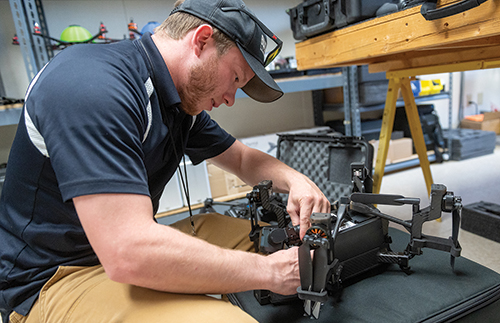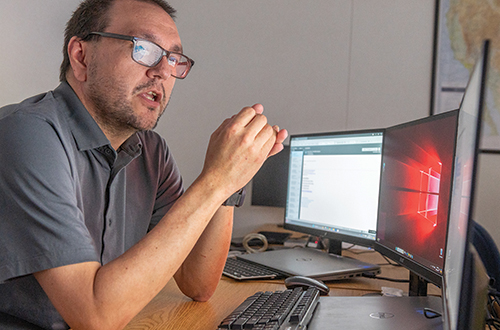As New Mexico’s land-grant university, NMSU is dedicated to serving the state’s diverse population through teaching, research and public service. With an uptick in extreme weather events such as wildfires and flooding devastating parts of the state and region, equipping first responders and emergency management personnel with the latest tools and trainings can help a community’s response.
Since July 2023, the NMSU UAS Flight Test Site, which is one of seven FAA-approved test sites in the country, has hosted nine in-person Federal Emergency Management Agency training classes at the Las Cruces Airport NMSU UAS FTS Hangar to introduce uncrewed aircraft systems, or UAS, to first responders and emergency management personnel. With grant funding, FEMA and the Alliance for System Safety of Unmanned Aircraft Systems through Research Excellence, or ASSUREd Safe, sponsored the trainings, which were offered at no cost to agencies or individual participants.
“Our goal is to provide training solutions to address national preparedness gaps,” says Jennifer Bjoraker, PSL Aerospace Division deputy director. “The development of national UAS programs for integration in emergency management operations before, during and after disasters will provide a consistent training solution for first responders across all FEMA regions.”
More than 50 first responders from law enforcement, fire departments and county organizations in New Mexico, Arizona and Texas participated in the courses.
“In an emergency, time matters. Getting accurate and relevant information into leadership’s hands benefits everything,” says Thomas Homan, course participant and geographic information system/911 addressing supervisor for Gila County Public Works in Globe, Arizona. “Seeing the time criticality of the data will help me to better plan for field operations to have the resources for computing and connectivity. Events I have been on typically have involved a one- to two-hour drive time back to a network point of presence.”
While this is the first time the NMSU Flight Test Site has conducted training for first responders, NMSU UASFTS staff are well-versed in sharing its mastery. The NMSU Flight Test Site has been involved in large-scale STEM UAS outreach projects through the FAA and ASSURE that reached about 900 teachers and more than 12,000 students.
“UAS are an important tool for search and rescue teams, law enforcement and firefighters, as well as industry that may need UAS for inspections, agriculture or mapping,” Bjoraker says. “The NMSU UAS Flight Test Site has existed for over 25 years and provides cutting-edge research on UAS systems to enable the FAA to develop policy for safety operating UAS in the National Airspace System. We feel our expertise provides community benefit by advancing technology through research and testing to ensure safety of flight in controlled settings.”
Bjoraker says the feedback the test site has received from first responders about the course content and delivery has been very positive.
“Getting stick time flying UAS and working in the classroom with UAS mission planning and UAS data processing and analysis tools provides the participants an opportunity to see how UAS can be applied in their organizations and beneficial to the work they do,” she says.

Josh Fisher, NMSU PSL UAS Flight Test Site pilot, works on a UAS during a FEMA training course, which introduces the resource to first responders and emergency management personnel.

Jaime Ponce de Leon, NMSU PSL UAS Flight Test Site ASSUREd SAFE instructor, has a discussion during a FEMA training course. NMSU has hosted nine in-person trainings since July 2023.

Dove Hall, Room 212
305 N. Horseshoe Drive
Las Cruces, NM 88003